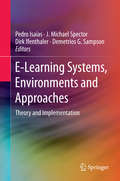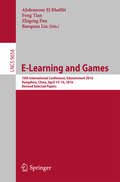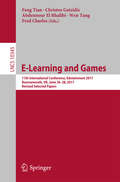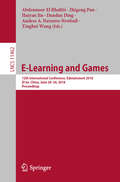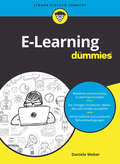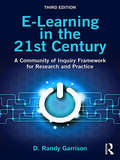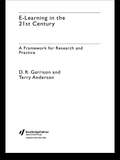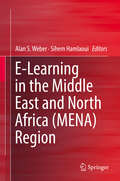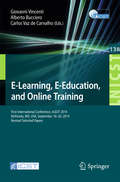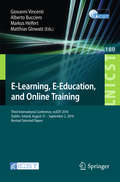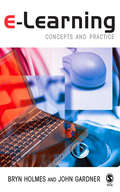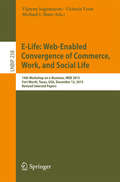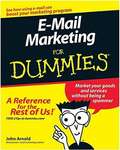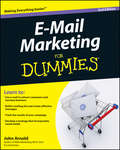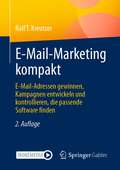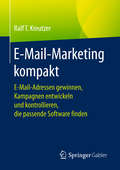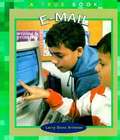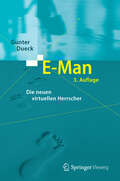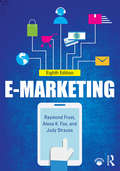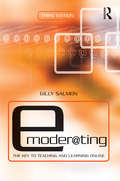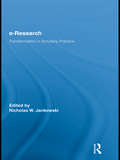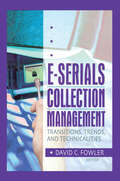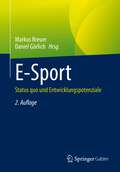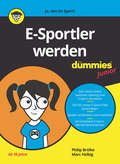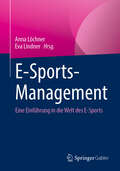- Table View
- List View
E-Learning Systems, Environments and Approaches
by Dirk Ifenthaler J. Michael Spector Demetrios G. Sampson Pedro IsaíasThe volume consists of twenty-five chapters selected from among peer-reviewed papers presented at the CELDA (Cognition and Exploratory Learning in the Digital Age) 2013 Conference held in Fort Worth, Texas, USA, in October 2013 and also from world class scholars in e-learning systems, environments and approaches. The following sub-topics are included: Exploratory Learning Technologies (Part I), e-Learning social web design (Part II), Learner communities through e-Learning implementations (Part III), Collaborative and student-centered e-Learning design (Part IV). E-Learning has been, since its initial stages, a synonym for flexibility. While this dynamic nature has mainly been associated with time and space it is safe to argue that currently it embraces other aspects such as the learners' profile, the scope of subjects that can be taught electronically and the technology it employs. New technologies also widen the range of activities and skills developed in e-Learning. Electronic learning environments have evolved past the exclusive delivery of knowledge. Technology has endowed e-Learning with the possibility of remotely fomenting problem solving skills, critical thinking and team work, by investing in information exchange, collaboration, personalisation and community building.
E-Learning and Games
by Feng Tian Zhigeng Pan Abdennour El Rhalibi Baoquan LiuThis book constitutes the refereed proceedings of the 10th International Conference on E-Learning and Games, Edutainment 2016, held in Hangzhou, China, in April 2016. The 36 full papers presented were carefully reviewed and selected from 60 submissions. They are organized in the following topical sections: E-learning and game; graphics, imaging and applications; intelligent data analytics and visualization.
E-Learning and Games
by Christos Gatzidis Feng Tian Abdennour El Rhalibi Wen Tang Fred CharlesThis book constitutes the refereed proceedings of the 10th International Conference on E-Learning and Games, Edutainment 2016, held in Hangzhou, China, in April 2016. The 36 full papers presented were carefully reviewed and selected from 60 submissions. They are organized in the following topical sections: E-learning and game; graphics, imaging and applications; intelligent data analytics and visualization.
E-Learning and Games: 12th International Conference, Edutainment 2018, Xi'an, China, June 28–30, 2018, Proceedings (Lecture Notes in Computer Science #11462)
by Zhigeng Pan Abdennour El Rhalibi Haiyan Jin Dandan Ding Andres A. Navarro-Newball Yinghui WangThis book constitutes the refereed proceedings of the 12th International Conference on e-Learning and Games, EDUTAINMENT 2018, held in Xi’an, China, in June 2018. The 32 full and 32 short papers presented in this volume were carefully reviewed and selected from 85 submissions. The papers were organized in topical sections named: virtual reality and augmented reality in edutainment; gamification for serious game and training; graphics, imaging and applications; game rendering and animation; game rendering and animation and computer vision in edutainment; e-learning and game; and computer vision in edutainment.
E-Learning für Dummies (Für Dummies)
by Daniela WeberEgal, ob beim Unterrichten an der Uni, bei Weiterbildungen im Job oder bei der Arbeit von Trainern, ohne Lerninhalte im Internet ist dies kaum mehr vorstellbar. Erfahren Sie wie Sie Ihr Online-Angebot richtig erstellen. Daniela Weber erklärt Ihnen die Grundlagen des E-Learning und gibt Ihnen das richtige Handwerkszeug mit, um bewährte und innovative E-Learning-Konzepte erfolgreich und im Budget umzusetzen. Dabei erfahren Sie alles Wichtige von der Wahl der geeigneten Instrumente und Inhalte bis hin zur Implementierung Ihres E-Learning-Angebots. So gelingt Ihr Start in der Online-Lehre.
E-Learning in the 21st Century: A Community of Inquiry Framework for Research and Practice
by D. Randy GarrisonThe third edition of E-Learning in the 21st Century provides a coherent, comprehensive, and empirically-based framework for understanding e-learning in higher education. Garrison draws on his decades of experience and extensive research in the field to explore technological, pedagogical, and organizational implications. The third edition has been fully updated throughout and includes new material on learning technologies, MOOCs, blended learning, leadership, and the importance and role of social connections in thinking and learning, highlighting the transformative and disruptive impact that e-learning has recently had on education.
E-Learning in the 21st Century: A Framework for Research and Practice
by D. Randy GarrisonThere is currently a technological revolution taking place in higher education. The growth of e-learning is being described as explosive, unprecedented, and above all, disruptive. This timely and comprehensive book provides a coherent framework for understanding e-learning in higher education.The authors draw on their extensive research in the area to explore the technological, pedagogical and organisational implications of e-learning, and more importantly, they provide practical models for educators to use to realise the full potential of e-learning. A unique feature of the book is that the authors focus less on the ever-evolving technologies and more on the search for an understanding of these technologies from an educational perspective.This book will be invaluable for researchers, practitioners and senior administrators looking for guidance on how to successfully adopt e-learning in their institutions. It will also appeal to anyone with an interest in the impact of e-learning on higher education and society.
E-Learning in the Middle East and North Africa (MENA) Region
by Alan S. Weber Sihem HamlaouiIn the last decade, due to factors of ICT infrastructural and broadband maturation, rising levels of educational attainment and computer literacy, and diversification strategies, e-learning has exploded in the Middle East and North Africa (MENA) region. However, significant barriers remain in the region’s e-learning development: lack of research on outcomes and effectiveness, paucity of Arabic language learning objects, monopolies and high cost of telecommunications, cultural taboos, accreditation, censorship, and teacher training.This unique volume is the first comprehensive effort to describe the history, development, and current state of e-learning in each of the 20 MENA countries from Algeria to Yemen. Each entry is expertly written by a specialist who is acutely familiar with the state of e-learning in their respective country, and concludes with a bibliography of key reports, peer-reviewed books and articles, and web resources.E-Learning in the Middle East and North Africa (MENA) proves itself as a vital compendium for a wide readership that includes academics and students, transnational program directors, international education experts, MENA government departments, commercial vendors and investors, and ICT development and regulatory agencies involved in e-learning in the Middle East.
E-Learning, E-Education, and Online Training
by Carlos Vaz de Carvalho Giovanni Vincenti Alberto BuccieroThis book constitutes the proceedings of the SecondInternational Conference on E-Learning, E-Education, and Online Training, eLEOT2015, held in Novedrate, Italy, in September 2015. The 26 revised full papers presented were carefully reviewedand selected from 52 submissions. They focus on e-learning and distanceeducation in science, technology, engineering and math.
E-Learning, E-Education, and Online Training
by Markus Helfert Giovanni Vincenti Alberto Bucciero Matthias GlowatzThis book constitutes the proceedings of the 3rd International Conference on E-Learning, E-Education, and Online Training, eLEOT 2016, held in Dublin, Ireland, August 31 - September 2, 2016. The 25 revised full papers presented were carefully reviewed and selected from 35 submissions. They focus on topics as augmented reality learning, blended learning, learning analytics, mobile learning, virtual learning environments.
E-Learning: Concepts and Practice
by Bryn Holmes John R. Gardnere-Learning is now an essential component of education. Globalization, the proliferation of information available on the Internet and the importance of knowledge-based economies have added a whole new dimension to teaching and learning. As more tutors, students and trainees, and institutions adopt online learning there is a need for resources that will examine and inform this field. Using examples from around the world, the authors of e-Learning: Concepts and Practices provide an in-depth examination of past, present and future e-learning approaches, and explore the implications of applying e-learning in practice. Topics include: - educational evolution - enriching the learning experience - learner empowerment - design concepts and considerations - creation of e-communities - communal constructivism This book is essential reading for anyone involved in technology enhanced learning systems, whether an expert or coming new to the area. It will be of particular relevance to those involved in teaching or studying for information technology in education degrees, in training through e-learning courses and with developing e-learning resources. Bryn Holmes is an assistant professor in Education at Concordia University, Montreal and director of an Internet company, Inishnet, which offers research and consultancy in online education. John Gardner is a professor of education at Queen's University, Belfast and his main research areas include policy and practice in information and communications technology in education.
E-Life: Web-Enabled Convergence of Commerce, Work, and Social Life
by Vijayan Sugumaran Victoria Yoon Michael J. ShawThis book constitutes the refereed proceedings of the Workshop on E-Business (WEB 2011), held in Shanghai, China, on December 4, 2011. The 40 papers, which were selected from 88 submissions to the workshop, touch on topics that are diverse yet highly relevant to the challenges faced by today's e-business researchers and practitioners. They are organized in topical sections on social networks, business intelligence, and social computing; economics and organizational implications of electronic markets; and e-business systems and applications.
E-Mail Marketing For Dummies
by ArnoldUpdated to reflect the hottest new trends, technologies, and strategies!Much has happened in e-mail marketing since the first edition of this book appeared in 2007. With the dramatic rise of social media and mobile devices, there are more ways than ever to target campaigns and maximize your e-mail marketing dollars. The new edition of this helpful book is full of practical advice, whether you?re an enterprise-level marketer using a third-party e-mail marketing company or small business owner handling everything yourself.Helps you map out an e-mail marketing strategy with reachable objectivesSimplifies the process of list-building, message-creation, and results-trackingOffers legal guidance, so you stay compliant with anti-spam lawsShows you how to deliver your message and incorporate social mediaExplains how to track and interpret resultsIncludes the top ten things you should not put in your messages, and much moreGet more out of your e-mail marketing campaigns with this easy-to-follow guide.
E-Mail Marketing For Dummies
by John ArnoldUpdated to reflect the hottest new trends, technologies, and strategies! Much has happened in e-mail marketing since the first edition of this book appeared in 2007. With the dramatic rise of social media and mobile devices, there are more ways than ever to target campaigns and maximize your e-mail marketing dollars. The new edition of this helpful book is full of practical advice, whether you?re an enterprise-level marketer using a third-party e-mail marketing company or small business owner handling everything yourself. Helps you map out an e-mail marketing strategy with reachable objectives Simplifies the process of list-building, message-creation, and results-tracking Offers legal guidance, so you stay compliant with anti-spam laws Shows you how to deliver your message and incorporate social media Explains how to track and interpret results Includes the top ten things you should not put in your messages, and much more Get more out of your e-mail marketing campaigns with this easy-to-follow guide.
E-Mail-Marketing kompakt: E-Mail-Adressen gewinnen, Kampagnen entwickeln und kontrollieren, die passende Software finden
by Ralf T. KreutzerDieses Buch zeigt, dass E-Mail-Marketing für die Unternehmenskommunikation unverzichtbar ist und bleibt. Es gibt über vier Milliarden E-Mail-Accounts, aber „nur“ knapp drei Milliarden Facebook-Nutzer. Schon allein durch diese Zahlen wird die Relevanz des E-Mail-Marketings deutlich. Durch E-Mail-Marketing kann und darf unmittelbar verkauft werden. Und Erfolge lassen sich leicht feststellen. Aber wie sollte das E-Mail-Marketing heute ausgestaltet werden? Welche Erfolgsfaktoren sind zu berücksichtigen? Wie sind E-Mails und E-Newsletter zu gestalten, um eine möglichst hohe Wirkung zu entfalten? Und anhand welcher KPIs kann der Erfolg gemessen werden? In diesem Werk werden alle zentralen Fragen zum E-Mail-Marketing kompetent beantwortet.In der 2. Auflage wurden alle Kapitel vollständig überarbeitet. Dabei sind neue Erkenntnisse zur Wirkung des E-Mail-Marketings eingeflossen. Zudem wird ein Konzept vorgestellt, mit dem die Verkaufsleistung von E-Mails und E-Newslettern signifikant gesteigert werden kann.Der InhaltKennzeichnung des E-Mail-MarketingsGewinnung und Nutzung von E-Mail-AdressenGestaltung von E-Mail- und E-Newsletter-KampagnenControlling des E-Mail-Marketings
E-Mail-Marketing kompakt: E-mail-adressen Gewinnen, Kampagnen Entwickeln Und Kontrollieren, Die Passende Software Finden
by Ralf T. KreutzerDieses Buch zeigt, dass E-Mail-Marketing für die Unternehmenskommunikation unverzichtbar ist und bleibt. Es gibt über fünf Milliarden E-Mail-Accounts, aber "nur" zwei Milliarden Facebook-Nutzer! Schon allein durch diese Zahlen wird die Relevanz des E-Mail-Marketings deutlich. Durch E-Mail-Marketing kann und darf unmittelbar verkauft werden. Und Erfolge lassen sich leicht feststellen. Aber wie sollte das E-Mail-Marketing heute ausgestaltet werden? Welche Erfolgsfaktoren sind zu berücksichtigen? Wie sind E-Mails und E-Newsletter zu gestalten, um eine möglichst hohe Wirkung zu entfalten? Und anhand welcher KPIs kann der Erfolg gemessen werden? In diesem Werk werden alle zentralen Fragen zum E-Mail-Marketing kompetent beantwortet.
E-Mail: A True Book
by Larry Dane BrimnerCompletely redesigned for today's young, investigative reader, True Books are an indispensable addition to any collection. Each book guides the reader through the facts that nurture their need to know. The new, dynamic True Book design features: -- an inviting and interactive page format, -- a readable and attractive typeface, -- large, bold, and brilliant full-color photographs. The True Books series takes the young reader beyond the standard, fact-filled text by adding avenues for further discovery. Each book includes a variety of sidebars, highlighting extra facts that will fascinate children. In the Important Words section, young readers will find a glossary of words that will both challenge and expand their vocabulary. Each book includes a To Find Out More section, where every curious reader can find a list of related books to read and organizations to contact. True Books also point readers to the vast electronic universe of information on the Internet. Each book will list: -- e-mail addresses to help the reader contact individuals and organizations, -- appropriate newsgroups and mailing lists, -- FTP sites to download fun and useful software.
E-Man
by Gunter DueckDie Haupteigenschaften des in der Wirtschaft "ausschlaggebenden" Menschen werden sich ändern. Wir verlassen die "Bauerngesellschaft" der ruhigen, pflichttreuen Menschen, die Tradition, Erfahrung und Orndung herrschen lassen (Old Economy). die neue Zeit "kämpft" mit neuen Geschäftsmodellen und immer schnelleren Technologiezyklen um die Milliarden, die der Erste im Markt erringen kann. Keine Zeit mehr für Erfahrung & Co. Wie wird das sein - in E-Man's World? Besser? Mit 40 Millionär oder Burnout? Wie lange tobt der Umbruch? E-Man muss vor allem kreativ, proaktiv, authentisch, erneuerungs- und risikofähig sein, voller Verrtrauen im stärksten Wandel. Ein Bericht aus der Turbulenzzone des Managements und des Innermenschlichen. Wie gewohnt spannend, provokativ, streitbar und leidenschaftlich subjektiv! Die dritte Auflage wurde um ein Nachwort des Autors ergänzt.
E-Marketing (Eighth Edition): International Edition
by Raymond D. Frost Judy Strauss Alexa Fox<p>E-Marketing is the most comprehensive book on digital marketing, covering all the topics students need to understand to "think like a marketer". <p>This updated edition connects digital marketing topics to the traditional marketing framework, making it easier for students to grasp the concepts and strategies involved in developing a digital marketing plan. With a strategic approach that focuses on performance metrics and monitoring, it is a highly practical book. The authors recognize that the digital landscape is constantly and rapidly changing, and the book is structured to encourage students to explore the digital space, and to think critically about their own online behavior. <p>‘Success stories’, ‘trend impact’, and ‘let’s get technical’ boxes, as well as online activities at the end of each chapter provide undergraduate students with everything they need to be successful in creating and executing a winning digital marketing strategy.</p>
E-Moderating: The Key to Online Teaching and Learning (Open And Distance Learning Ser.)
by Gilly SalmonProfessor Gilly Salmon has achieved continuity and illumination of the seminal five stage model, together with new research-based developments, in her much-awaited third edition of E-Moderating – the most quoted and successful guide for e-learning practitioners. Never content to offer superficial revisions or simple "solutions" against the pace of technological advances, the expanding interest and requirements for online learning, and the changes they have wrought, E-Moderating, Third Edition offers a richness of applied topics that will directly impact learners and teachers of all kinds. The book is carefully crafted and supported with evidence, examples, and resources for practical guidelines, making it potentially transformational for all practitioners. E-Moderating, Third Edition includes: updates of literature, key terms, case studies and projects fresh examples of the use of the five stage model around the world, at different levels of education and across disciplines guidelines for moderating for podcasting and virtual worlds illustrations from the latest All Things in Moderation development programmes (www.atimod.com) new resources for practitioners a companion website: www.e-moderating.com.
E-Research: Transformation in Scholarly Practice (Routledge Advances in Research Methods)
by Nicholas W. JankowskiNo less than a revolutionary transformation of the research enterprise is underway. This transformation extends beyond the natural sciences, where 'e-research' has become the modus operandi, and is penetrating the social sciences and humanities, sometimes with differences in accent and label. Many suggest that the very essence of scholarship in these areas is changing. The everyday procedures and practices of traditional forms of scholarship are affected by these and other features of e-research. This volume, which features renowned scholars from across the globe who are active in the social sciences and humanities, provides critical reflection on the overall emergence of e-research, particularly on its adoption and adaptation by the social sciences and humanities.
E-Serials Collection Management: Transitions, Trends, and Technicalities
by Jim Cole Wayne Jones David C FowlerLearn how information professionals are addressing the electronic resource issues being faced in their own libraries and around the world! This informative volume gives you an up-close look at the increasingly important role that electronic serials play in the overall library collection, today and in the future. It addresses many of the themes, problems, and questions raised by this fast-evolving medium, including e-journal publishing issues, troubleshooting, and accreditation issues, as well as e-reserves, e-books, and more. In E-Serials Collection Management: Transitions, Trends, and Technicalities, library professionals from the United States, Canada, United Kingdom, and Australia discuss these issues, the problems they have faced, and the solutions they have developed for them. From the editor: It is my belief that e-serials will continue to emerge as the key players in the library world, as the physical library gradually and inexorably gives way to the virtual library. As e-journals insinuate themselves throughout the infrastructures of libraries and expand their reach globally, the issues addressed in this book are becoming of concern to all librarians, not just the electronic resources and information technology specialists. Librarians all over the world are struggling with how to manage electronic serials and the issues associated with them. In this book, readers will see how library professionals just like themselves deal with electronic journals, their transitions, trends, and technicalities. With helpful graphs, figures, and charts making the information in the book easily accessible and understandable, E-Serials Collection Management: Transitions, Trends, and Technicalities will increase your understanding of: the interrelationship between pricing, licensing, technological aspects, and proximity to publishers and librariesfrom the point of view of a leading global subscription agent the benefits and pitfalls of using vendors/publishers, third-party providers, and subscription agents for electronic journal services how information professionals are currently developing and cataloging online materialswith a survey of 70 libraries! the IP ranges vs. passwords conundrum the advantages of joining a consortium to make journals available to users at a lower cost to your library how to determine the amount of usage your electronic products are getting claiming and troubleshooting e-journalswith a fascinating case study from UCLA's biomedical library how to efficiently handle electronic articles destined for a reserve collection how to select an e-book model that will satisfy your users and your staff open-access systems and softwareand what they mean to your institution regional accreditation for e-serials using a database-driven approach to manage e-resources and more!
E-Sport: Status quo und Entwicklungspotenziale
by Markus Breuer Daniel GörlichDieses Fachbuch bietet einen umfassenden und vielseitigen Überblick über Aspekte des elektronischen Sports (E-Sport). Renommierte Vertreter aus Wissenschaft, Sport und Wirtschaft vermitteln die Perspektiven unterschiedlicher Stakeholder wie verschiedener Sportorganisationen (Breitensportvereine, Verbände, Profi-Clubs), aktiver E-Sportler und der Games-Branche. E-Sport gehört zu den im Sport und in der Games-Branche am kontroversesten diskutierten Themen: Ist E-Sport Sport? Sollte er von der Politik gefördert werden? Sollte er olympisch werden? Dieses Buch leistet einen wichtigen Beitrag zu einem tieferen Verständnis des Themas, denn die Fragen nach dem Status des E-Sports sind schon längst keine rein akademischen oder politischen Fragen mehr, sondern betreffen ganz real und tagtäglich Millionen von Spielern und E-Sportlern ebenso wie hunderte Vereine und Unternehmen.Für die zweite Auflage wurde das Buch komplett überarbeitet, aktualisiert und um ein neues Kapitel zum Sexismus und zur Rolle der Geschlechter im E-Sport ergänzt.
E-Sportler Werden für Dummies Junior (Für Dummies)
by Philip Brulke Marc HelbigIn diesem Buch erfährst du, wie aus "Daddeln" und "Zocken" professioneller E-Sport wird: Welches Spiel, welcher Titel passt zu dir? Wie und wann solltest du trainieren? Wie gehst du mit Niederlagen um? Was kannst du aus Fehlern lernen? Außerdem erfährst du, dass es neben dem Job als Spieler noch weitere Berufe im E-Sport gibt und wie du dich auf diese vorbereiten kannst. Und auch wenn du den E-Sport nicht als Profi betreiben und auch nicht in diesem Bereich arbeiten willst, wirst du beim Spielen einfach besser werden. Denn auch Hobbysportler wollen doch gewinnen, oder? Bestens geeignet für Kinder und Jugendliche ab 10 Jahren.
E-Sports-Management: Eine Einführung in die digitale Welt des Sports
by Anna Löchner Eva LindnerDas Thema E-Sports ist ein Phänomen des digitalen Zeitalters und hat sich mittlerweile zum Gesellschaftsphänomen des 21. Jahrhunderts entwickelt. Früher noch als Nischenmarkt belächelt, dominieren Video- und Onlinespiele mittlerweile die internationale Unterhaltungsbranche und E-Sports-Events füllen heute Stadien und locken Millionen von Menschen vor den Live-Stream. Mit Preisgeldern in Millionenhöhe, einem steigenden Interesse von Sponsoren und Investoren und einer zunehmenden Spieleranzahl hat sich der E-Sport zu einem gewaltigen Ökosystem mit einer Vielzahl von Stakeholdern entwickelt.Das vorliegende Herausgeberwerk beschäftigt sich mit einzelnen Bereichen des E-Sports-Managements und zeigt verschiedene Facetten auf. Durch die Verbindung von Wissenschaft und Praxis erhalten Stakeholder der E-Sports-Branche einen Überblick über die aktuellen Themen und Herausforderungen im E-Sports-Ökosystem.
